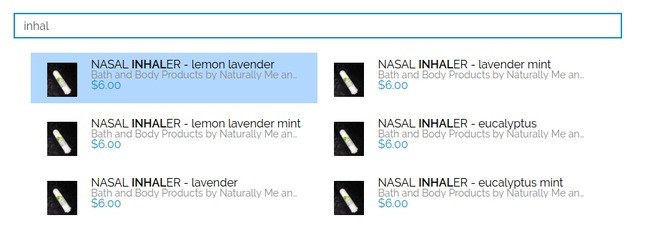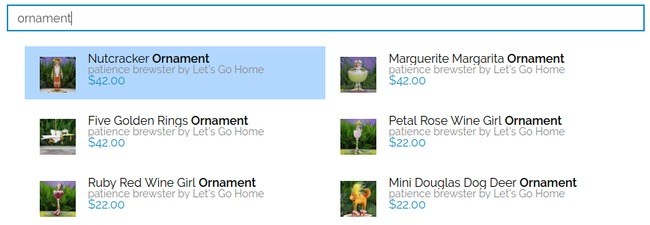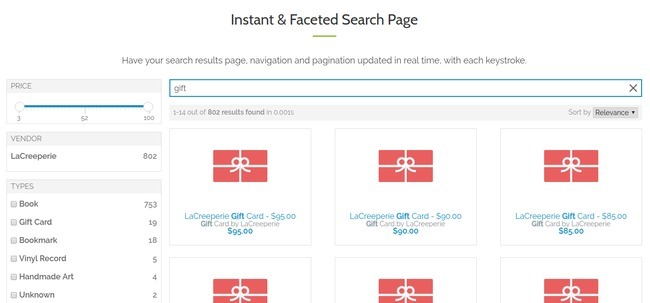When I think about the search bar when building an ecommerce shop, my immediate reaction is, “Looks fine.” It's funny because before I started getting educated by some smarter folks, I figured a search bar was the most basic of tools, one that had minimal effect on overall conversions. Boy was I wrong. After implementing a few more advanced search bar tools, I began realizing just why Google has an edge over Bing. Search modules matter, big time.
In fact, an incredible number of people who come to your site go straight for the search bar. This means you want to wow them, or at least make like a sports referee and avoid getting noticed (because of the smoothness of the search). Therefore, I would recommend not being satisfied with your current search integration, especially if using Shopify. So many other apps are available to improve your experience. As an example, we found an app called Algolia For Shopify.
Installation comes easy, it doesn't slow down your site and the search results pull information from your site in realtime.
Only a handful of tactics are almost guaranteed to increase conversions, and I'd be foolish not to add this to the list. Continue reading this Algolia For Shopify review to learn about the features and to evaluate whether it's the right solution for you.
Algolia For Shopify Features
As-You-Type Search Functionality
A prime advantage of Algolia is that all searches are completed as the user types. Therefore, you're going to cut down on the amount of time the user spends searching, while also suggesting products to them as they type in certain keywords.

For example, if I were to punch in the letters “inhal” for a certain site, Algolia has already scanned the store to immediately fill in the related products, blog posts or pages. From the screenshot you'll see that inhalers are the primary ones that come up.
We're all used to this on Google, so there's no reason not to have something like it on your ecommerce store. The UX improves, and you're bound to get some suggestions that the customer didn't think of before.
Direct Access to Your Product Catalog Through the Search Bar
Some search bars deliver results from Google, while others scramble through the site after the user hits the Search button. Algolia, on the other hand, connects immediately to your product catalog, cutting out the need for lengthy search times. All of the products are already registered with the search engine.

Not to mention, the product information displays right under the search module. Therefore, customers see product titles, descriptions and pricing, all without even going to the product pages.
Realtime Updating of Results Page and Navigation

Another interesting part about Algolia is that the users don't have to click on the Search button to receive their results. The results pages can be updated in realtime, showing a list of the related products, along with relevant menu items and filters.
Typo Tolerance
Going along with our comparison to Google, Algolia has what's called typo tolerance, where you can type in a wildly inaccurate version of a keyword and still get the right search results. It's almost as if the search engine knows what you're thinking. In reality, it's utilizing common searches, the products already located in your store and even the tendencies of the current user.
Geo-Search and Languages
Customers aren't going to make purchases unless they see the information in their own language. Luckily, Algolia for Shopify translates to just about every language you can think of.
Algolia For Shopify Pricing
Pricing for Algolia For Shopify looks confusing, yet reasonable. To start, you get a free plan to choose from. After you exceed a number of records and operations per month the pricing goes by a benchmarked pay as you go system.
Note: A record is any item on your site that contains data and can be searched. An operation is completed when a search is performed or when a new record is modified, added or deleted.
- Hacker – Free for up to 10,000 records and 100,000 operations per month.
- Starter – $49 for up to 100,000 records and 1,000,000 operations per month. The plan has email support.
- Growth – $249 for up to 1,000,000 records and 10,000,000 operations per month. The plan has email support and UX guidance.
- Pro – $899 for up to 5,000,000 records and 50,000,000 operations per month. The plan has live chat support, UX guidance, a 1:1 workshop, extensions and plugin support.
- Enterprise – $3,990 for unlimited records, operations and analytics. You receive dedicated infrastructure for the best performance, a dedicated customer solutions engineer, enterprise-class SLA and exclusive enterprise premium options.
The free trial provides 14-days of any plan you want, and you don't have to punch in your credit card information.
Do You Get Any Support?
That's a good question, since so many Shopify plugins offer questionable, or minimal, support. Although Algolia doesn't have any support listed for the free plan, you still gain access to social media accounts, the email newsletter, a blog, contact form, documentation and an FAQs page.
Once you start paying for your plans, you can get everything from email support to a dedicated representative. I like the idea of the UX guidance, since you're paying a large amount of money. There's no reason to squander the placement of your search bar by not listening to the experts.
Overall, I give the Algolia app a big thumbs up for support.
Who Should Consider Algolia For Shopify?
Since a free version is available, I figure every Shopify store should at least give Algolia for Shopify a try. After that, we recommend testing out the plans and looking at the reports after maybe six months. This way, you can understand if it's working for your company.

If you have any questions about Algolia, let us know in the comment section below.




There is also Algolia for wordpress. The issue, here, for most blogs and small sites, is the price.
Hey there! I’m the Algolia for Shopify creator!
Thanks for this blog post, it’s a really cool review you’ve done here, I’m glad you enjoyed using it!
One small note though, you said:
> Furthermore, it allows for customer targeting based on location. This comes in handy when you have physical stores listed on your site. Therefore, they might find a product they enjoy, but it’s only offered in stores. Algolia does the work for you by finding how close a customer is to the best location.
Unfortunately, that’s not the case.
While we do indeed target customers based on their location, it’s only to reduce latency between them and our servers. We call that the Distributed Search Network ( https://www.algolia.com/infra ). Unfortunately, the app doesn’t support PoS location (at least at the moment!).
Got it, thanks for clarifying Matthieu, and great work with the plugin! Keep improving it!